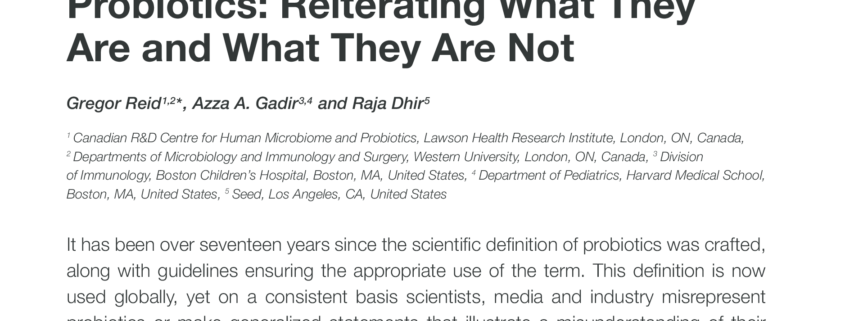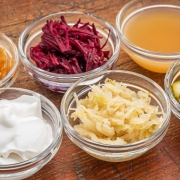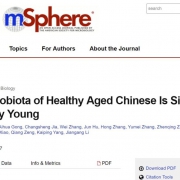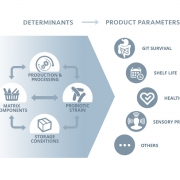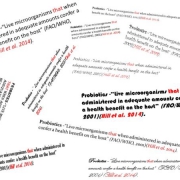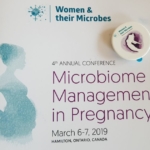The Art of Interpretation
By Prof. Gregor Reid, BSc Hons PhD MBA ARM CCM Dr HS, Lawson Research Institute, University of Western Ontario, Canada
It takes a certain degree of intelligence to become a scientist, and certainly hard work to be able to fund a lab and students. Yet, is it not bemusing when scientists cannot interpret simple things like definitions and the results of human studies?
I’ve written repeatedly, as have others, about the definition of probiotics (in case you forgot – “Live microorganisms that, (or which) when administered in adequate amounts, confer a health benefit on the host”),1,2 and yet people look at it and must think that ‘dead’ fits, as does ‘consume’, as does ‘colonize’. It beggar’s belief how such a simple definition can be so badly interpreted by intelligent people.
Time after time papers I review mis-write and/or misinterpret the definition. Conference after conference, I hear dieticians, pharmacists, physicians, scientists not only get the definition wrong, but say things like ‘the probiotics in kombucha’ when there are none, ‘we have lots of probiotics in our gut’ when you don’t unless you consumed them, ‘the lactobacilli need to colonize’ when this was never a prerequisite nor does it happen except in rare instances.
The interpretation gets more difficult when people use terms that are completely undefined like ‘psycho-biotics’ and ‘post-biotics’. Even ‘dead probiotics’ have been used in clinical trials – God help us when the authors can’t even define it. Why stop at killing probiotic strains? Why not just kill any bacterial strain? Even the gut-brain axis which is now mentioned everywhere in the literature is undefined and unproven. The vagus nerve links to many body sites as does the nervous system, making it exceedingly difficult to prove that brain responses are only due to the gut microbes.
Everyone can site a manuscript that has been badly analyzed, interpreted or peer-reviewed, or whose findings are overblown. But let’s not excuse this as ‘it’s just science’ or ‘it’s just the way it is.’ No, it is not. When a paper uses a product that is stated to be ‘probiotic’, there is an onus on the authors to make sure the product meets the appropriate criteria. These have been stated over and over again and reiterated this March, 2019.3
If scientists and science writers are really that smart, then how do they keep getting this wrong? How do we let a poorly analyzed paper get published and allow authors to say that Bacteroides fragilis is a probiotic that can treat autism?4,5 And when this leads to companies claiming probiotics can treat autism, why do other scientists convey cynicism for the field instead of against their colleagues and specific companies making the false claims?
Where does opinion cross the line with ignorance or stupidity? Martin Luther King Jr. must have predicted life today when he said, “Nothing in all the world is more dangerous than sincere ignorance and conscientious stupidity.”
Is it envy or anger that drives the anti-probiotic sentiments? It seems to go far beyond a difference of opinion. When the BBC and JAMA fail to comment on two much better and larger studies on the effects of probiotics published6,7 at the same time as the ones in Cell8,9 that were promoted by press releases, what is driving opinion? The science or the press releases? Are the journalists and communications’ people interpreting study results vigorously? One cannot believe they are.
In an era where anyone can write anything at any time and pass it along to the world, what are we recipients to do? Just go with our instincts? Soon, we will not know the difference between fact and fake news. The avatars will be so real, we will act on falsehoods without knowing. When all news is fake, where does that leave us as people, never mind scientists?
Manuscripts are sent for peer-review but how many reviewers are experts in bioinformatics, molecular genetics, clinical medicine, biostatistics and what happens on the front line of products to consumers or patients? Like it or not, poor studies will get out there and it will be the media who will tell the story and interpret the findings or press releases.
One must hope that confirmatory science will continue and if it fails, the writers and readers will stop citing the original incorrect report. But how often does that happen? And what are we left with?
It takes effort to object or fight back, but if we don’t then the fake news will become the norm.
Try interpreting that if you will.
Literature Cited
- FAO/WHO. 2001. Probiotics in food. http://www.fao.org/food/food-safety-quality/a-z-index/probiotics/en/
- Hill C. et al. 2014. The International Scientific Association for Probiotics and Prebiotics consensus statement on the scope and appropriate use of the term probiotics. Nat. Reviews Gastroenterol. Hepatol. 11(8):506-14.
- Reid G. et al. 2019. Probiotics: reiterating what they are and what they are not. Front. Microbiol. 10: article 424.
- Hsiao et al. 2013. Microbiota modulate behavioral and physiological abnormalities associated with neurodevelopmental disorders. Cell. 155(7):1451-63.
- Sharon G, et al. 2016. The central nervous system and the gut microbiome. Cell. 167(4):915-932.
- Korpela K. et al. 2018. Probiotic supplementation restores normal microbiota composition and function in antibiotic-treated and in caesarean-born infants. Microbiome. 6(1):182.
- De Wolfe, T.J. et al. 2018. Oral probiotic combination of Lactobacillus and Bifidobacterium alters the gastrointestinal microbiota during antibiotic treatment for Clostridium difficile infection. PLoS One. 13(9):e0204253.
- Suez J. et al. (2018). Post-antibiotic gut mucosal microbiome reconstitution is impaired by probiotics and improved by autologous FMT. Cell. 2018 Sep 6;174(6):1406-1423.e16.
- Zmora N. et al. 2018. Personalized gut mucosal colonization resistance to empiric probiotics is associated with unique host and microbiome features. Cell. Sep 6;174(6):1388-1405.e21.

